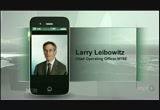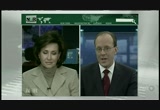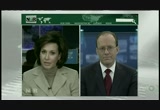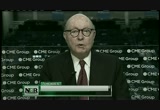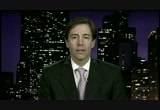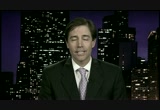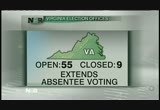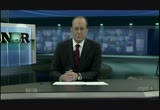tv Nightly Business Report PBS October 30, 2012 7:00pm-7:30pm EDT
7:00 pm
>> this is nbr. captioning sponsored by wpbt >> susie: good evening, everyone. i'm susie gharib. hurricane sandy brings the city that never sleeps to its knees, leaving millions without power. >> tom: i'm tom hudson. wall street is working on a comeback with plans to reopen stock trading tomorrow, despite heavy flooding in lower manhattan. >> susie: from crippled transportation throughout the northeast to canceled flights, the federal response and potential election impact. we'll have all that and more right here on nbr! >> tom: hurricane sandy is now super-storm sandy as it clashes with another weather system, bringing wind, rain, and snow to parts of the mid-atlantic and northeastern u.s.
7:01 pm
she has cut a path of destruction, flooding, and massive power outages as the death toll from the storm stands at 17 across seven states. even as sandy makes her way to canada, the destruction is devastating. high winds pushed the atlantic ocean up and over seawalls, flooding entire neighborhoods. the wind and water teamed up to cut power to millions of people along the eastern seaboard. the storm surge even continued today as sandy tracked through western pennsylvania and new york state. the storm has affected an estimated one out of every five americans, bringing some business to a standstill over flooding, closed airports, and no public transportation. while rescue efforts continue tonight, early damage estimates are still rough, running between $10 billion and $20 billion, according to eqecat. hurricane irene did $10 billion damage 14 months ago. >> susie: wall street was closed
7:02 pm
again today for the second straight day because of hurricane sandy. this is the first two-day weather-related shutdown since 1888. but the major exchanges are expected to reopen tomorrow. all systems are a go. the new york stock exchange said the opening bell will ring as usual at 9:30 a.m. eastern time. the nasdaq will also open for normal operations on wednesday. that's just what investors wanted to hear. both exchanges have been running tests today to make sure all systems were running smoothly. >> susie: the nyse's building is located on wall street, just blocks away from the section of lower manhattan that was deluged by hurricane sandy. but there was no flooding at the big board, and no other damage to the building, trading floor and trading systems.
7:03 pm
but while the nyse and nasdaq expect tomorrow to be business as usual, it won't be a typical day for people trying to get to work. many of new york's bridges and tunnels are still closed and subways are flooded. it could take five days or more for mass transit to get back to normal. and tom, it could be a volatile day of trading tomorrow once the opening bell rings. >> tom: we've seen several companies delay quarterly financial reports because of the storm, so the volume of corporate news for shareholders to consider will be very business as well. >> susie: and that's why it's going to be a lot of volatility. a lot of pent up demand to respond to all of the news headlines over the last couple of days and besides the earnings reports, there's a number of ipos, at least six delays for this week. investors are eag tore respond to all of that, and you know,
7:04 pm
tom, it's october 31st, halloween, and the end of the month, a time when a lot of money managers have to rebalance portfolios. so it's a lot of activity tomorrow. >> tom: susie, we know there's transportation trouble going on around new york, new jersey, connecticut. could that hold down trading volume or increase it because we haven't been open for two days? >> a lot of trading is electronic, so you don't necessarily have to be there physically to trade. however, the new york stock exchange is trying to get as many of their traders in. tell be slow start up, and they're arranging car pools and hotel rooms to get people in tonight. so that definitely will play into the markets tomorrow, and also, just the sentiment for investors. some people might look at this as a buying opportunity, and really want to get in there, others might be cautious. some might want to go to cash because it is the end of the month. there's a lot of factors. transportation and investor sentiment. >> tom: and through the
7:05 pm
sentiment, it's important that upon business start getting back to normal, even though the rest of the lives of new yorkers and folks on the eastern seaboard remains farp from it. >> susie: absolutely. and you know, we're seeing here today, a lot like a ghost town yesterday. but now taxis are out, people are out. some stores are open. so business beginning to open. but i think tell be difficult until the end of the week before it gets a little more back to normal. >> tom: david ruder is the former chairman much the securities and exchange commission, and joins us from the cme group in chicago. professor, it's great to have you back on the program. was together right decision to close all trading for the past two days? >> i think so. exactly. we should not have closing on the exchanges when there's great uncertainly. that's the last thing investmentors want. so telling the public it will close in advance was the right decision. >> tom: you led during the 87
7:06 pm
market crash, and electronic trading now accounts for a majority of trading volume. why not allow for the electronic trading only even if the physical building was closed? >> the electronic trading feeds off some of the physical trading. but most of it is electronic. you would not want the electronic trading to go down. that to me is the greatest wor neour markets today s. what's going to happen when those algorhythms kick in. you need to have people running the algorhythms. without people in the building, i think the electronic trading wouldn't have worked. >> tom: wasn't it a matter of regulators and administrators not being able to man or person the exchange in the trading versus the inability of brokers and trading to actually come to the marketplace and buy and sell? >> i think the algorhythms could have worked all by
7:07 pm
themselves with nobody involved. that's the way they operate now. but you need to have human beings and individuals available in case something goes wrong. and of course, you do need for the value traders -- you need to have somebody making a real decision whether to buy or not. >> tom: since 9/11, the exchange and brokerages have spent millions of dollars to build out redundant systems away from new york. if those are not used, are they useful? >> oh, yes they are. you don't know what the nature of the disruption will be. and there's electronic outage, suddenly, you need to have those backup systems, as you did on 9/11. you had the backup systems created because of the y2k problem. >> tom: why couldn't we use those this time around? >> i don't think there's been enough systems established to deal with the high frequency trading environment. we're in an entirely different situation now in the last five
7:08 pm
years. even the locations. one of the very interesting parts of that is very mysterious about how could you have work if you had disruptions. >> tom: colocation is when a broker or trader puts their computer next to the exchange computer sometimes at the exchange. >> and finally, david, are you confident that the exchanges are ready to go tomorrow? >> i think they will be. if they say they are. this is a market situation. the exchanges know what's going on. they say they're ready. i'm confident they will be there. >> tom: you've been in that seat before. david ruder with us from the cme group, former chairman of the securities and exchange commission. >> tom: lincoln ellis is the chief investment officer with the strategic financial group. with us from chicago. do you think a cautious day of trading or a wild day of
7:09 pm
volatility? >> well, probably a bit of both. as you know, it's the month's end, and you have a fair amount of portfolio rebalancing that will happen tomorrow. that combineed with two day's worth of pent up trading pressure. it will make for interesting trades. as david eluded to, it the be interesting across particular sectors as the day goes on. >> tom: speaking of which, what will you have your eye on in terms of stock sectors? >> what we really are interested in and have been looking at are the potential overvaluations of a lot of the defensive sectors in the s&p 500 as you made note over in the past. we see a lot of the typically defensive sectors now trading at multiples two or three times above the larger broader markets, and actually that's worrying. >> tom: couldn't the kind of situation we're seeing on the eastern seaboard, though, the short term economic of the destruction that we're seeing
7:10 pm
-- forget the rebuilding for now. couldn't that lead to a more defensive stance on the parliament of shareholders? >> it could, but that would probably be to exit those markets or to enter more safe securities f. that were to be the case tomorrow, again, you would be headed to our staples neighborhoods rjs the dividend producing neighborhoods, and the exception of utilities given their hit in this storm. look, it's the end of the month. we've been off two days. tell be an interesting day to watch. >> tom: very interesting. do you wind up buying, though, if you see the initial reaction moving lower? i guess if you're moving away from defensive areas are you looking for growth and where are you going to find it? >> i think at this stage of the game, tom, given the way that equities have performed and they performed extraordniarily well this year as, in fact, have large parts
7:11 pm
of the fixed income complex, it may be prudent for investors to actually be looking to take a little money off the table in both of those baskets, wait until we get through the election, a little more clarity not only in 1600 pennsylvania avenue, but over there in the houses of congress, and see where we are setted up in terms of traject reap for the conversations around the fiscal cliff. we also have a transfer of power in china happening in the first part of november. a lot of things happening, and we've had good returns, so it might serve investors well to step to the sidelines a bit. >> tom: i want to talk in the final minute about the bond market. it's also closed. not a lot of activity going on there. certainly where the federal reserve is in game, in play. interest rates are low. do you anticipate any initial reaction here the at end of the month with the bond market reopening? >> well, the futures contract have been open.
7:12 pm
we have seen moderate ranges over the course of the last two days over those trading as well as the european markets which have relative value between, say, german bunds, their 10 year bonds and our u.s. 10 year treasury. given where interest rates are, and given where we are both in the american earnings cycle and in the economic calendar more broadly, i would expect very small moves in bonds for the balance of the year as investmentors continue to stay defensively positioned and concerned about the issues that we talked about earlier. >> tom: all right. lincoln, get some rest. back at it tomorrow are if the first time in four long days. in chicago, chief investment officer at the strategic financial group. while the stock exchanges get back to business, the federal government is getting down to business in responding to the widespread disaster. sylvia hall has the latest on the federal response.
7:13 pm
>> reporter: as east coast residents survey the mess sandy brought ashore, federal, state and local governments are already coordinating the cleanup. right now, thousands of workers from every level of government are on a rescue mission in new jersey and new york's hardest- hit areas. fema is pulling in generators and working with power companies to get the lights back on. the storm's damage was so severe that president obama quickly declared major disasters in new york and new jersey overnight. the decision frees up federal dollars to help families and businesses recover their losses. it also allows the u.s. to reimburse local and state governments for some of the expenses they'll face as they rebuild. the east coast may be cleaning up, but sandy isn't finished. the storm is plowing inland, dumping snow across the appalachians. with sandy still churning, it's nearly impossible to know how extensive the damage will be or how long the cleanup will last. sylvia hall, nbr, washington. >> tom: earlier, susie mentioned the challenges of getting around
7:14 pm
one of the world's largest and most congested cities with no public transportation. city buses began rolling on new york streets at 5:00 p.m. eastern time today, but only partial service and on a reduced schedule. we have more on the work ahead to get new york moving again with erika miller. >> reporter: in new york city, the subway is a lifeline. the transportation network is the center of culture and commerce. more than four million people a day go through subway turnstiles, which are part of the largest mass transit system in the nation. the 108-year-old system has never faced a disaster as devastating as this one. it's not just a matter of restoring power and cleaning up sludge and debris. the big unknown is whether salt water will corrode signal and switch systems. fortunately, most of the train cars weren't damaged by the storm, because they were moved to safety ahead of time. but it's unclear when service will be fully restored. when it does, service will come
7:15 pm
back in stages, with riders forced to rely on a mix of trains and buses to get around town. that's creating a big headache for many families. kids take the subways to school, their parents take the trains to work. and a hobbled-together transportation system makes the massive recovery effort even more challenging. erika miller, nbr, new york. >> tom: more than 8 million homes and businesses lost power because of sandy, and some have been told not to expect power to be restored for more than a week. the blackout blameed on sandy's wind and water stretches from maine down to north carolina, and as far west tonight as indiana. new jersey is the hardest hit with 60% of customers in new jersey with no electricity. two and a half million without power. some of the public trade utilities hit, consolidated edison, pepco, ppl and first
7:16 pm
energy. travis miller covers them for morningstar. travis, how will these companies pay for the repair job they're facing ahead of them? >> there's no question that utilities are in for a huge bill from this. and really, the last two years they've been hit multiple times with large rep pair bills and outages. if you're looking for utilities that come from repair costs they have to make, and putteding up flyers to bring back the power plants online, but also the lost revenue they have when utiltd customers are out of power and can't pay their bills because the system is out. >> tom: travis, do they have the operating cash flow to pay for these? are they going to have to borrow mony and issue bonds? >> >> we think the utilities, are well capitalized and have
7:17 pm
plenty of cash. in the scheme of things, these are multibillion companies, and you're probably talking about upwards of a billion dollars, our estimate for the bill, and at least for new york and new jersey. >> tom: you think they're in good financial shape to be able to withstand that without having to tap into bonds? what about dif denlds? could shareholder dividends be at risk? >> there's a lot of cash out the door, but in general, and we assume in general in new york and new jersey some of the hardest places hit, we'll recognize this is a cash cost for the utilities, and we hope for shareholders that they expedite that cash recovery for the utilities, and that dif denlds are not at risk when you're thinking about paydays over the next couple of quarters. >> tom: this is an industry that's seen cob solidation over the past several years. will something like this speed mergers up or perhaps slow it
7:18 pm
down? >> i think you're not going to see much m & a. you're think being huge liabilities that utilities face here in the next couple of months as they repair the system. so it's like a few utilities when thinking about regulated operations and cash flow stream are going to shy away from the utilities with the big utilities right now. >> tom: travis miller covering utilities for morningstar. thank you. >> tom: let's get you caught up on some other news. the labor department still hopes to release the october
7:19 pm
employment report this friday, as scheduled. currently, economists expect as many as 114,000 jobs were added to u.s. payrolls in october, with the unemployment rate holding steady at 7.8%. home prices continued their comeback in august, marking gains in some of the hardest hit housing markets. the s&p case-shiller home price index tracks prices in 20 major cities, finding prices rose 2% in august compared to a year ago. ford did not postpone its scheduled third quarter earnings announcement, opting to go forward with the news this morning after what a company official tells us were long discussions yesterday. ford earned 40 cents per share, a dime more than estimates. that's lower than a year ago as business in europe remains weak. but chief financial officer bob
7:20 pm
shanks says ford is adapting its successful north american strategy for europe. >> we're taking a lot of the learnings, a lot of the same elements of what created an extremely robust business here in north america and applying that to the situation in europe. and we're very confident thp we're going to get that part of our business back on track by mid-decade, and looking forward to that. >> tom: shanks doesn't expect europe to show signs of recovery for another year or so. ford's north american business continues strong, hitting record earnings in the third quarter with a 12% profit margin, it's highest ever in the region. there was strength elsewhere, through. ford sold more of its focus compact cars in asia and africa than it did in north america or europe. and "the force" is now with disney. the media giant is buying lucasfilm limited. that's the company owned and founded by "star wars" director george lucas. the price tag-- $4 billion. disney gets the "star wars" franchise, consumer products,
7:21 pm
and lucasfilm's portfolio of entertainment technology patents. "star wars: episode 7" is expected to be released in 2015. >> tom: while the u.s. presidential race was already too close to call, now the candidates and election supervisors in the northeast have the aftermath of hurricane sandy to deal with. darren gersh looks at the potential impact on a key swing states. >> reporter: fears that super-storm sandy would disrupt voting and the presidential election are receding as the
7:22 pm
storm heads north and away from the united states. the storm hit new jersey hard, but the state makes it easy to vote early by mail, and that makes it unlikely the storm will keep many from sending in their ballots. new york does not offer early voting, giving officials there time to recover by election day. in the key swing state of virginia, election offices in 55 counties were up and running today. just nine remain closed and those are expected to reopen soon. the virginia secretary of state has asked local election officials to extend absentee voting hours through saturday. sandy has not disrupted early voting in ohio, a state expected to prove decisive in the election. but if you need a daily fix of polling data, you are in for a letdown. millions of voters along the mid-atlantic and northeast are in cleanup and recovery mode, and pollsters know the last thing they'll be thinking about is answering a call about the election. gallup is suspending it's daily tracking poll, and others say it will be difficult to reach a representative sample of voters needed to get a good read on the race. as for whether sandy will push
7:23 pm
this tight election one way or another, few experts are willing to venture a guess. so far, even new jersey republican chris christie has given the president high marks for his handling of the storm, but the recovery effort is just beginning. darren gersh, nbr, washington. >> tom: tomorrow on nbr, as wall street gets back to business, we'll be watching general motors as it releases third quarter results. the size and scope of sandy is difficult to comprehend at times. but a disaster like this has millions of personal stories of getting by during difficult times. >> reporter: this is bronxville, westchester county, new york, where the storm of a lifetime has turned this sleepy suburban community into a town of haves and have-nots. spaghetti-like electric lines, thanks to downed trees, have left hundreds of homes without power.
7:24 pm
and con-ed is saying it could take seven days before the lights turn back on. downtown bronxville has power and is open for business. the local a&p is out of bread, but at topps bakery, there's plenty on shelves. and most importantly, there's still lots of coffee, because it's going to be a very long week. >> reporter: suzanne pratt, nbr, bronxville, new york.
7:25 pm
>> the streets are busy, and the e-mails are taking longer than usual. and in my own personal case. no tv, and no internet. it's typical to be a news reporter in these circumstances. tom, you may be use to it. you're in florida and used to dealing with tropical storms and hurricanes, but for us in the big apple. it's a brand new experience. >> tom: that's "nightly business report" for tuesday, october 30. good night, everyone, and stay safe. we'll see you online at nbr.com, and back here tomorrow night.
161 Views
IN COLLECTIONS
WMPT (PBS) Television Archive
Television Archive  Television Archive News Search Service
Television Archive News Search Service 
Uploaded by TV Archive on

 Live Music Archive
Live Music Archive Librivox Free Audio
Librivox Free Audio Metropolitan Museum
Metropolitan Museum Cleveland Museum of Art
Cleveland Museum of Art Internet Arcade
Internet Arcade Console Living Room
Console Living Room Books to Borrow
Books to Borrow Open Library
Open Library TV News
TV News Understanding 9/11
Understanding 9/11

